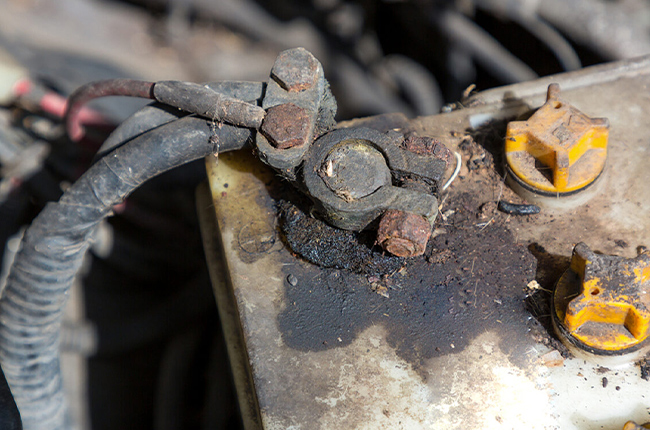
Car batteries are generally resilient parts that last a long time when maintained the right way. In hotter climates like in the Philippines, the typical auto battery would last you three years, or four if you're lucky. That said, your battery isn't impervious to damage, particularly leaks.
Whatever you drive, be it a small hatchback like the Kia Picanto or a midsize SUV like the Nissan Terra, you're bound to encounter a leaking battery at one point or another. It's not terribly likely, especially if you're a good car owner, but it's helpful to know what to do when it happens.
How can I tell if my car battery is leaking?

If you're doing a routine check or you suspect a leaking battery, these are the signs you should check out:
- Battery casing cracks of any size
- Fluid trickling down cracks
- Cracked or damaged vent caps
- Bubbling liquid flowing from vent caps
- Deformed, warped, or visibly damaged battery casing
If you see any of these signs in your car's battery, it could be a cause for immediate replacement. Don't wait until another component becomes damaged. Car batteries have sulfuric acid, and this can be dangerous. Left unchecked, the acid will cause corrosion by oxidizing other parts and causing untold damage.
Its vapor is also a potent respiratory irritant that can cause fatal conditions such as pulmonary edema. Don't even think about skin contact, as sulfuric acid can cause severe burns and even tissue damage. So, don't try to drive around with a damaged car battery. It's not worth it, and it can cause more trouble than it's worth. When in doubt, replace the battery and call it a day.
Can a sealed car battery leak acid?

Many car batteries today boast of being "maintenance-free." These are the sealed variety that promises a better ownership experience. Sealed batteries are distinct from conventional flooded batteries in that their chemical makeup is slightly different. Sealed units consume significantly less water than flooded batteries, so there's typically no need to top them off with water regularly.
Sealed batteries only contain enough liquid to enable the electrolytes to flow and build power. That means considerably less maintenance work and a better ability to function well in different climates. However, sealed units are not without their disadvantages. These batteries tend to not last as long as their flooded counterparts, meaning you'll likely have to replace yours more often.
Like regular flooded batteries, sealed batteries are not invincible. A sealed unit can and will leak acid with enough damage, and when this happens, there's nothing else to do but replace it.
So, whichever type of battery you have on your car, it's clear that leaks are always possible. Battery acid leaks are corrosive and yes, explosive. A leaking battery can catch fire at any moment, and nobody wants that. As we mentioned, don't try to salvage a damaged battery. The best course of action is to replace it with a brand new unit that will keep you safe and serve you well.
Latest Features
-
An all-electric future: The Porsche Macan Electric / Featured Article
Porsche’s Macan goes all-electric; it’s a new beast with an electrified heart, yet unmistakably Porsche in performance and spirit.
-
Which Kia should I buy? / Featured Article
We’re here to help you decide which Kia vehicle is best for you, whether it’s a sedan, crossover, or minivan.
-
Why Lynk & Co is a good option for luxury car buyers / Featured Article
Lynk & Co offers premium value for those exploring the luxury market.
Popular Articles
-
Electric Vehicles in the Philippines for under P1 million
Jerome Tresvalles · Aug 19, 2025
-
Top 3 Cars For Every Lifestyle—What Cars Are Right For You? | Behind a Desk
Caco Tirona · Apr 24, 2024
-
5 Tips to Maximize Fuel Efficiency
Jerome Tresvalles · Sep 09, 2024
-
Five driving habits that are draining your fuel tank
Jerome Tresvalles · Jun 24, 2025
-
Can engine braking harm your engine?
Jerome Tresvalles · Sep 11, 2025
-
Do electric cars even need maintenance?
Jerome Tresvalles · Oct 23, 2024
-
Best vehicles for an active outdoor lifestyle
Shaynah Miranda · Jul 25, 2024
-
How to drive different types of vehicle transmissions
May 23, 2024
-
5 easy ways to keep your car interior clean
Allysa Mae Zulueta · Nov 15, 2021
-
How to survive Metro Manila traffic
Earl Lee · Aug 16, 2022



